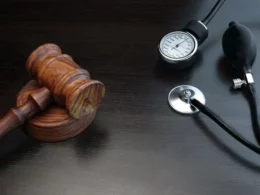Medical negligence is a serious concern that can have devastating consequences for patients and their families. When a healthcare professional fails to provide the standard of care expected of them, it can lead to serious injury, illness, and even death.
If you or a someone you care about has experienced medical negligence, it’s important to understand the elements of a medical negligence claim and how to pursue legal action.
In this article, we will explore the key components of a medical negligence claim, including the duty of care, breach of duty, causation, and damages.
By the end of this article, you will have a comprehensive understanding of what it takes to build a successful medical negligence case and how to protect your rights in the face of medical malpractice. So, let’s dive in and explore the world of medical negligence claims together.
What is Medical Negligence?
Medical negligence, also known as medical malpractice, occurs when a healthcare provider fails to provide appropriate treatment or care to a patient, resulting in injury or harm. Medical negligence can occur in various healthcare settings, including hospitals, clinics, and private practices.
Elements of a Medical Negligence Claim
To prove medical negligence, you must establish four legal elements: duty, breach of duty, causation, and damages. These elements are explained in detail below:
| Legal Element | Explanation |
|---|---|
| Duty | The healthcare provider had a legal duty to provide you with appropriate treatment or care. |
| Breach of Duty | The healthcare provider breached their legal duty by providing substandard medical care. |
| Causation | The healthcare provider’s breach of duty caused your injury or harm. |
| Damages | You suffered actual damages as a result of the healthcare provider’s breach of duty and resulting harm. |
To prove a breach of duty, you must show that the healthcare provider failed to provide the appropriate standard of care. The appropriate standard of care is determined by what a reasonable healthcare provider in the same situation would have done. This is often established through expert witness testimony.
It is important to note that medical negligence claims are subject to a statute of limitations, which limits the amount of time you have to file a claim. The statute of limitations varies by state and type of claim, so it is important to consult with an experienced medical malpractice attorney as soon as possible.
Suppose you believe that you have been a victim of medical negligence. In that case, you may be entitled to monetary compensation for your medical costs, lost wages, pain and suffering, and other resulting damages. An experienced medical malpractice attorney can help you navigate the legal process and pursue a personal injury claim.
When Does Medical Negligence Occur?
When you seek medical treatment, you expect your healthcare provider to provide you with a certain standard of care. Medical negligence occurs when a healthcare provider fails to provide that standard of care, resulting in harm to the patient.
To prove medical negligence, four legal elements must be established:
- Duty of Care: The healthcare provider must have had a duty to provide a certain standard of care to the patient. This duty of care is established when the healthcare provider agrees to treat the patient or when the patient seeks treatment from the healthcare provider.
- Breach of Duty: The healthcare provider must have breached their duty of care by failing to provide the standard of care that another healthcare provider in the same field would have provided under similar circumstances.
- Causation: The breach of duty must have caused the patient harm. This harm can be physical, emotional, or financial.
- Damages: The patient must have suffered damages as a result of the harm caused by the breach of duty. These damages can include medical expenses, lost wages, and pain and suffering.
It’s important to note that a healthcare provider can be held liable for medical negligence even if they did not intend to harm the patient. Medical negligence can occur due to errors in diagnosis, treatment, or management of a patient’s care.
If you believe you have been a victim of medical negligence, it’s important to seek legal advice from a qualified attorney. They can help you determine if you have a valid claim and guide you through the legal process.
Elements of a Medical Negligence Claim
If you have been the victim of medical negligence, you may be entitled to compensation. A medical negligence claim is a type of personal injury claim that is brought against a healthcare provider who has caused harm through substandard medical care. In order to prove a medical negligence claim, you must establish four legal elements: duty of care, breach of duty, causation, and damages.
Duty of Care
The duty of care is the legal duty that a healthcare provider owes to their patient. It means that the healthcare provider must provide treatment that is consistent with the accepted medical standard of care.
This standard is based on what a reasonable healthcare provider with the same training and experience would do in similar circumstances. If the healthcare provider fails to provide the appropriate treatment, they may be liable for medical negligence.
Breach of Duty
Breach of duty occurs when the healthcare provider fails to meet the standard of care owed to the patient.
This can happen in a number of ways, including misdiagnosis, failure to diagnose, surgical errors, and failure to obtain informed consent. If the healthcare provider’s actions fall below the standard of care, they may be considered negligent.
Causation
Causation means that the healthcare provider’s breach of duty caused the patient’s injury. This can be difficult to prove, as it requires showing that the healthcare provider’s actions were the direct cause of the harm suffered by the patient. In some cases, it may be necessary to hire expert witnesses to establish causation.
Damages
Damages refer to the harm suffered by the patient as a result of the healthcare provider’s negligence. This can include medical bills, lost wages, pain and suffering, and emotional distress. In order to recover damages, the patient must be able to show that they suffered actual harm as a result of the healthcare provider’s negligence.
Overall, proving a medical negligence claim can be complex and challenging. It is important to work with an experienced medical malpractice attorney who can help you navigate the legal system and obtain the compensation you deserve. If you believe you have been the victim of medical negligence, it is important to act quickly, as there are strict time limits for filing a claim.
1. Duty of Care
When you seek medical attention, you expect your healthcare provider to provide you with appropriate treatment. This expectation is based on the concept of “duty of care.” As a patient, you have the right to expect that your healthcare provider will take reasonable care to prevent harm to you.
In medical negligence cases, it is essential to establish that the healthcare provider owed a duty of care to the patient. A duty of care is a legal obligation that requires healthcare providers to meet certain standards of care when treating patients. The duty of care is a professional duty that healthcare providers owe to their patients.
The duty of care requires healthcare providers to provide care that meets the accepted medical standard of care. The accepted medical standard of care is the level of care that a reasonable and prudent medical professional would provide in similar circumstances. This standard of care is based on the prevailing medical practices in the relevant medical community.
Healthcare providers owe a duty of care to their patients regardless of the setting in which the treatment is provided. Whether the treatment is provided in a hospital, clinic, or doctor’s office, the healthcare provider has a duty of care to the patient.
In summary, the duty of care is a fundamental concept in medical negligence cases. Healthcare providers owe a duty of care to their patients to provide care that meets the accepted medical standard of care. As a patient, you have the right to expect that your healthcare provider will take reasonable care to prevent harm to you.
2. Breach of Duty
When a health care professional fails to provide the appropriate treatment or substandard medical care, they may be liable for medical negligence or malpractice.
To establish a medical negligence claim, you must prove that the health care professional had a professional duty to provide you with a certain standard of care. Once you establish that the health care professional had a professional duty, you must then show that they breached that duty.
A breach of duty occurs when a health care professional fails to provide the quality of care that another health care professional in the same medical community would have provided under similar circumstances. This means that the health care professional must have acted in a manner that falls below the standard of care expected of them.
For example, if a doctor fails to diagnose a patient’s condition even though another doctor in the same medical community would have done so, the doctor may have breached their duty of care. Similarly, if a doctor prescribes a medication that is known to be harmful to the patient, they may have breached their duty of care.
It is important to note that not every mistake made by a health care professional constitutes a breach of duty. Health care professionals are not held to a standard of perfection, and mistakes can happen even when they provide appropriate care. However, when a health care professional’s actions fall below the expected standard of care, they may be liable for medical negligence.
In summary, breach of duty is a crucial element in a medical negligence claim. To establish a breach of duty, you must show that the health care professional failed to provide the quality of care that another health care professional in the same medical community would have provided under similar circumstances. If you can establish a breach of duty, you may be able to pursue a medical negligence claim against the health care professional.
3. Causation
Causation is an essential element of a medical negligence claim. It is the link between the healthcare provider’s breach of duty and the patient’s injury. Without causation, there can be no medical negligence claim.
To establish causation, you must show that the healthcare provider’s breach of duty caused your injury. There are two types of causation: factual causation and legal causation. Factual causation is the “but for” test. It means that “but for” the healthcare provider’s breach of duty, the injury would not have occurred. Legal causation, on the other hand, is the question of whether the healthcare provider’s breach of duty was the proximate cause of the injury. Proximate cause means that the injury was a foreseeable consequence of the healthcare provider’s breach of duty.
In medical negligence cases, causation can be challenging to prove. This is because there may be other factors that contribute to the patient’s injury. For example, in misdiagnosis or failure to diagnose cases, it may be challenging to prove that the delay in diagnosis caused the patient’s injury. Similarly, in medical error cases, it may be difficult to establish that the healthcare provider’s negligence caused the patient’s injury.
To prove causation in a medical negligence claim, you will need to provide expert medical testimony. This testimony will help establish the link between the healthcare provider’s breach of duty and your injury. The expert will review your medical records, examine you, and provide an opinion on whether the healthcare provider’s breach of duty caused your injury.
In conclusion, causation is a critical element of a medical negligence claim. To establish causation, you must show that the healthcare provider’s breach of duty caused your injury. This can be challenging, but with the help of expert medical testimony, you can prove your case.
4. Damages
When a medical professional breaches their duty of care and causes harm to a patient, the patient may be entitled to damages. Damages refer to the monetary compensation awarded to the victim of medical negligence. Damages can be awarded for a variety of reasons, including medical bills, lost wages, pain and suffering, emotional distress, and more.
Medical bills are a common type of damages awarded in medical negligence cases. This includes any medical costs that were incurred as a result of the injury caused by the medical professional’s negligence. These medical bills may include hospital stays, surgeries, medications, and other treatments.
Lost wages are another type of damages that may be awarded in a medical negligence case. This refers to any income that was lost as a result of the injury caused by the medical professional’s negligence. This may include time off work for medical treatment or recovery, as well as any future lost wages if the injury has resulted in a long-term disability.
Pain and suffering and emotional distress are also types of damages that may be awarded in a medical negligence case. Pain and suffering refers to the physical and emotional pain that the victim has experienced as a result of the injury caused by the medical professional’s negligence. Emotional distress refers to the psychological impact that the injury has had on the victim.
In cases of medical negligence that result in wrongful death, damages may be awarded to the victim’s family members. These damages may include compensation for funeral expenses, loss of financial support, and loss of companionship.
It is important to note that damages awarded in a medical negligence case are considered actual damages, meaning they are intended to compensate the victim for their economic losses. Punitive damages, which are intended to punish the medical professional for their actions, are not typically awarded in medical negligence cases.
To sum up, damages are a crucial component of a medical negligence claim. They are intended to compensate the victim for their medical bills, lost wages, pain and suffering, emotional distress, and other resulting damages. If you believe you have been the victim of medical negligence, it is important to speak with an experienced attorney to discuss your options for seeking monetary compensation.
Conclusion
Medical negligence is a complex issue that requires careful consideration and expert legal guidance. When you understand the key elements of a medical negligence claim, including the duty of care, breach of duty, causation, and damages, you can protect your rights and seek justice for any harm you have suffered.
Remember that pursuing a medical negligence claim can be a challenging and emotionally taxing process, but with the right support and guidance, you can achieve a fair and just outcome.
If you believe that you or a loved one has been the victim of medical negligence, don’t hesitate to seek legal advice and explore your options for pursuing a claim. With the right legal team on your side, you can hold healthcare professionals accountable for their actions and ensure that you receive the compensation and justice you deserve.
YOU SHOULD ALSO READ:












